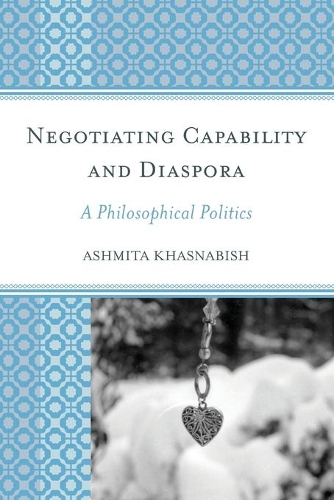
Negotiating Capability and Diaspora: A Philosophical Politics
(Paperback)
Publishing Details
Negotiating Capability and Diaspora: A Philosophical Politics
By (Author) Ashmita Khasnabish
Bloomsbury Publishing PLC
Lexington Books
15th December 2015
United States
Classifications
Professional and Scholarly
Non Fiction
Political economy
320.01
Physical Properties
Paperback
182
Width 152mm, Height 229mm
Description
Negotiating Capability and Diaspora: A Philosophical Politics scrutinizes Indian economist cum philosopher Amartya Sens theory of capability, which rose as a critique of the modern American philosopher John Rawlss theory of primary goods. Ashmita Khasnabish develops Sens theory of capability as a leitmotif throughout the book. She focuses on the following themes: 1) how Amartya Sens theory of capability offers strength to immigrants and underdogs; 2) the significance of John Rawlss theory for Sens theory of capability; 3) two aspects of Sens theory: on the one hand it exposes the asymmetry between people of power and the powerless due to the discrepancy of resources, and on the other hand it shows how the powerless or the underdogs or the minorities could exert their will-power through the paradigm of choices to overcome; 4) finally, Sri Aurobindos theory of democracy, which intersects with John Rawlss theory of comprehensive doctrines and political justice. Khasnabish also discusses authors Amitav Ghosh, Jhumpa Lahiri, and Toni Morrison, whose novels illustrate different facets of the theory of capability. Negotiating Capability and Diaspora develops themes that will be of great interest to students and scholars of political philosophy, feminist philosophy, postcolonial studies, literary studies, Diaspora studies, and world literature.
Reviews
Dr. Ashmita Khasnabish, the author of Negotiating Capability: A Philosophical Politics, seeks to develop an original answer to the daunting question: What must the individuals in the diaspora do to solve their cultural dislocations and the violations of their human dignity In the process of addressing this question, she engages three classical approaches in Global moral and political philosophy. They are: Entitlement Theories, Capability Challenges, and Eastern Pragmatist Ontologies and Philosophical Politics. . . .Khasnabish . . . adds her own voice, which she describes as that of a Diasporic Asian feminist. It is from this distinct perspective that she articulates a rich synthesis of the resource of the West and East, as she engages in the moral and political project of enabling the diaspora to be capable of satisfying its existential rights and to negotiate capability and existence, reason and emotion. In the end Khasnabish addresses the daunting question with which this review began. * CLR James Journal *
Leading on from her previous monographs, Ashmita Khasnabishs new volume, Negotiating Capability and Diaspora: A Philosophical Politics, is another unusual enquiry into contemporary postcolonial thought and literature. By combining the philosophies of Eastern and Western thinkers, Khasnabish creates a syncretic paradigm that casts the work of such diverse writers as Toni Morrison, Amitav Ghosh, and Jhumpa Lahriri in a new light. This book is an original and imaginative engagement with contemporary postcolonial and feminist debates. -- Melanie Otto, Trinity College
Ashmita Khasnabishs latest work Negotiating Capability and Diaspora: A Philosophical Politics is a bold attempt to examine the intellectual philosophies of Amartya Sen, John Rawls, Sri Aurobindo, and a host of other thinkers. The book starts with Sens Conglomerate Theory from his masterpiece The Idea of Justice, but it is primarily focused on his theory of capability in relation to Rawlss theory of primary goods. However, the book broadens its coverage by generously including the ideas of other important philosophers and also some selected works of literature. One can hardly forget Khasnabishs strong focus on the East-West dialogue in her argument. Although the work toys liberally with 'philosophical politics,' it remains firmly centered on Amartya Sen, the economist-philosopher. Undoubtedly, its deeper and broader philosophical base is much more intriguing and challenging. Indeed, it is a very valuable and commendable work in the history of ideas. -- K.D. Verma, University of Pittsburgh-Johnstown
Author Bio
Ashmita Khasnabish is visiting scholar in the Women and Gender Studies Program at Massachusetts Institute of Technology. She is author of Jouissance as Ananda: Indian Philosophy, Feminist Theory and Literature and Humanitarian Identity and the Political Sublime: Intervention of a Postcolonial Feminist and taught at various colleges and universities in Massachusetts.
